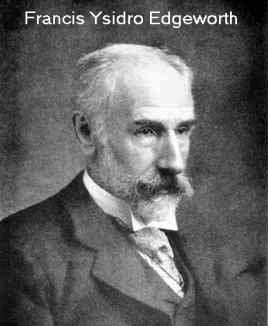
Francis Ysidro Edgeworth was born in Edgeworthstown on 8th February 1845. Francis Edgeworth came to study statistics after an education in ancient and modern languages. He entered Trinity College, Dublin at the age of 17 and studied French, German, Spanish and Italian. After graduating, he was awarded a scholarship to study at Oxford and he entered Exeter College in January 1867. At Oxford he spent some time at Magdalen and at Balliol, graduating in 1869.
Exactly what Edgeworth did in the years after leaving Oxford is unclear. He must have studied law at some time since he was called to the Bar in 1877. Three years later, however, he was lecturing in logic at King's College, London. In 1888 he was appointed Professor of Political Economics at King's College, London and, two years later, he was appointed to the Tooke chair of Economic Science.
The surprising part is that somewhere in this varied career Edgeworth studied mathematics. We have to assume that he was self-taught in mathematics and this might explain why he seemed to believe that advanced mathematics was understood by all. For example his first serious publication New and old methods of ethics (1877) is described by Kendal in [2] as follows:-
None of his writings, at any time in his life, consisted of the kind of prose, or orderly presentation of ideas, which give pleasure for their own sake; and in this particular work he actually writes down variational integrals, which must have put it beyond the understanding of most of those who were interested in ethical problems at that time.
In 1881 he published Mathematical Psychics: An Essay on the Application of Mathematics to the Moral Sciences. This work, really on economics, looks at the Economical Calculus and the Utilitarian Calculus. He formulated mathematically a capacity for happiness and a capacity for work. His conclusions that women have less capacity for pleasure and for work than do men would not be popular in the 1990's.
Edgeworth published Methods of Statistics in 1885 which presented an exposition of the application and interpretation of significance tests for the comparison of means.
In 1891 Edgeworth left London to take up the Drummond Chair of Political Economy at Oxford. He obtained a fellowship at All Souls College and he held both the chair and the fellowship until he retired in 1922. Another event of significance in 1891 was that the Economic Journal began publication with Edgeworth as its first editor. He continued to be editor until 1926 when Keynes took over the editorship.
In 1892 Edgeworth examined correlation and methods of estimating correlation coefficients in a series of papers. The first of these papers was Correlated Averages .
Edgeworth's work was to influence Pearson although bad feeling developed between the two and later Pearson was to deny Edgeworth's influence. At the Galton dinner in February 1926 Pearson spoke of Edgeworth's death a few days earlier:-
... him we can almost call a biometrician for he contributed to Biometrika ... Only last December he came and spoke as he had always spoken ... and his criticism failed as it had always failed, because he spoke not the language of the people. ... I should like to reckon him among the biometricians if he ploughed always right across the line of our furrows. Besides we owe him something; like a good German he knew that the Greek k is not a modern c, and, if any of you at any time wonder where the k in Biometrika comes from, I will frankly confess that I stole it from Edgeworth. Whenever you see that call to mind dear old Edgeworth." He died on 13 February 1926 in Oxford Professor F.Y. Edgeworth's Obituary